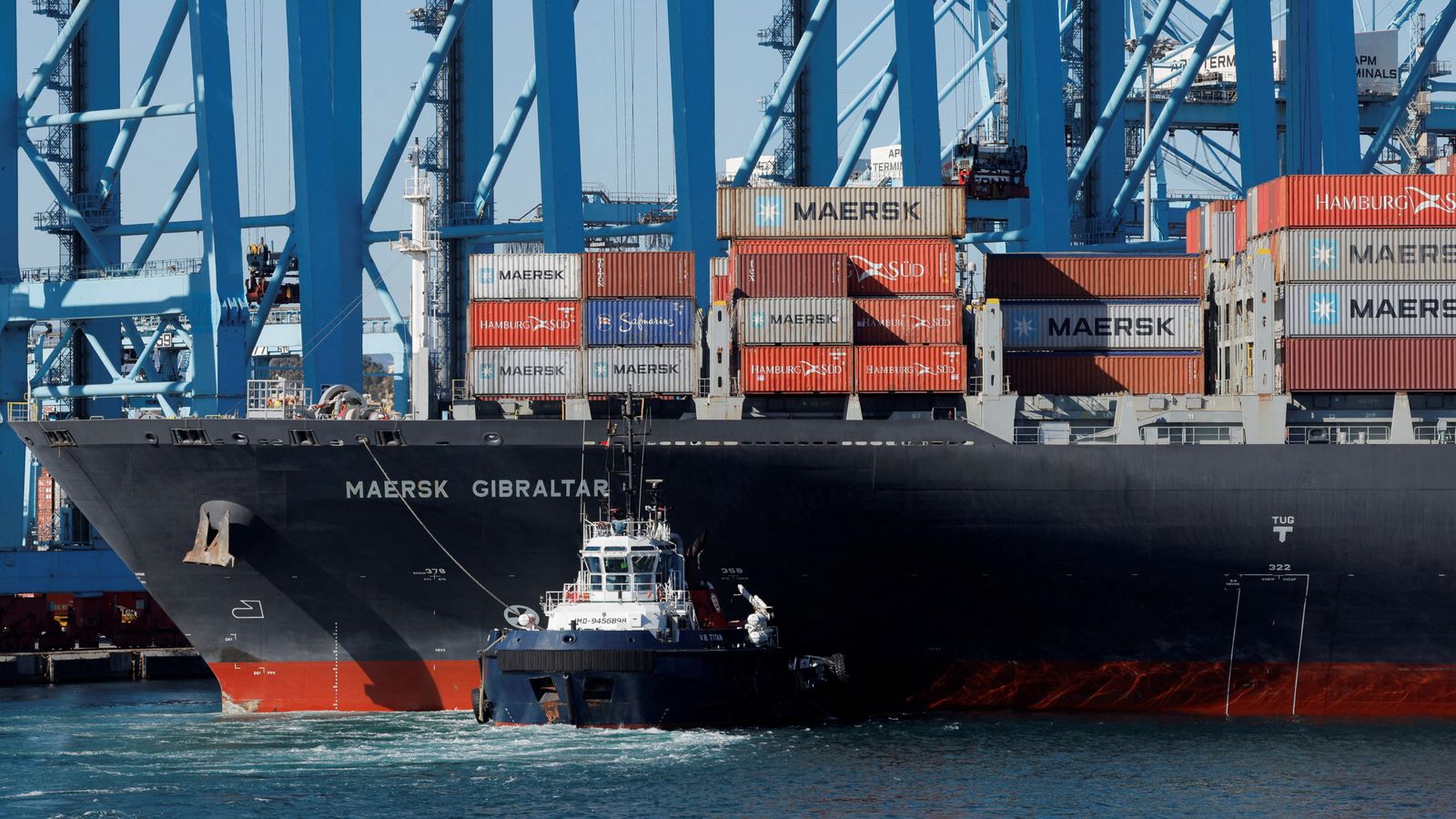Shipping costs have risen by more than 300% since November amid the disruption caused to freight in the Red Sea from attacks, according to fresh data.
Just hours after US and UK-led attacks on Yemen aimed at preventing renewed assaults on shipping by Iran-aligned Houthi rebels, it was revealed that freight prices continued to rise over the past week.
The most widely used measure of freight cost, the Shanghai Containerised Freight Index (SCFI), hit $3,101 (£2,429) per container from $2,871 (£2,249) last Friday, according to data given to Sky News by global logistics company DSV.
It meant that the SCFI, which measures the average cost of a 20ft-long container being shipped from Shanghai to Europe, was 310% up on the level seen at the start of November.
Money latest – Food delivery company fined for mass-spamming campaign
Marked increases started to be felt in the second half of that month as the Red Sea crisis intensified.
There have been more than two dozen attacks by Houthis on shipping, forcing major container and energy firms to re-route around Africa, avoiding the Suez Canal.
That adds many costs to freight.
Insurance bills are up as a result while journeys can take more than 10 days extra.
Staff wage costs have risen as a result and additional fuel must be burned.
Another factor at play is an increase in demand for goods ahead of disruption caused by the Chinese Spring Festival – the country’s new year holiday which gets underway next month.
Yemen’s Houthi rebels have stepped up attacks on vessels it believes are heading into and out of Israel, in support of Palestinians caught up in Israel’s backlash against Hamas following the 7 October attack launched from Gaza.
US and UK forces attacked several targets in an air operation on Thursday night in a bid to prevent further boat and drone-led attacks on shipping.
They fear damage to the global economy due to the delays and additional costs associated with avoiding the Suez Canal.
Many of the world’s largest shipping companies – including MSC, Maersk, CMA CGM, and Hapag-Lloyd – are still diverting many if not all planned Red Sea journeys via South Africa.
While many major companies, including Tesco in the UK, have said they are not experiencing damage from the disruption, other firms have been more vocal on the challenges.
IKEA, for example, has admitted that some products may not be available while Tesla revealed on Friday that it was pausing production at its factory in Germany for two weeks due to a shortage of parts.
While shipping costs are up markedly, they remain below the highs seen in March 2021 when the Ever Given container ship blocked the Suez Canal.
Nevertheless, the disruption has caught the eye of the governor of the Bank of England, who is charged with keeping the pace of price rises in check.
Read more:
Why are the Houthis attacking ships in the Red Sea and what does it mean for inflation?
Andrew Bailey will be mindful that raised shipping prices are an inflation risk as higher shipping costs are likely to be reflected in consumer bills as they are passed down the supply chain.
It’s a headwind he could do without as the inflation rate has been brought down substantially from 40-year highs in the wake of the price spike caused by Russia’s invasion of Ukraine.
He told a committee of MPs this week: “We’ve certainly seen, as best we can tell from the monitoring, shipping traffic is being affected and is being rerouted.
“That will increase shipping prices and shipping costs. I think initially that will be an issue in the monetary policy world.”
Oil costs rose by 2% on Friday following news of the US/UK-led action on speculation of the implications for Middle East stability.
Rosalie Chen, analyst at Third Bridge, said of the situation: “Our experts estimate that the current freight rates on the Europe route have reached their peak, as they already reflect the additional costs of bypassing.
“Even if all Europe route shipping companies choose to bypass the Cape of Good Hope, our experts do not believe it will cause a significant supply-demand gap.”

